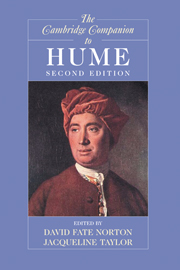Book contents
- Frontmatter
- 1 An Introduction to Hume’s Thought
- 2 Hume’s New Science of the Mind
- 3 Hume and the Mechanics of Mind: Impressions, Ideas, and Association
- 4 Hume’s Theory of Space and Time in Its Skeptical Context
- 5 Hume on Causation
- 6 Hume and the Problem of Personal Identity
- 7 Hume’s Skepticism
- 8 Hume’s Moral Psychology
- 9 The Foundations of Morality in Hume’s Treatise
- 10 Hume’s Later Moral Philosophy
- 11 The Structure of Hume’s Political Theory
- 12 Hume’s Principles of Political Economy
- 13 Hume on the Arts and “The Standard of Taste”: Texts and Contexts
- 14 David Hume: “The Historian”
- 15 Hume on Religion
- Appendix: Hume’s Autobiographies
- Selected Bibliography
- Index
- Series List
5 - Hume on Causation
Published online by Cambridge University Press: 28 May 2009
- Frontmatter
- 1 An Introduction to Hume’s Thought
- 2 Hume’s New Science of the Mind
- 3 Hume and the Mechanics of Mind: Impressions, Ideas, and Association
- 4 Hume’s Theory of Space and Time in Its Skeptical Context
- 5 Hume on Causation
- 6 Hume and the Problem of Personal Identity
- 7 Hume’s Skepticism
- 8 Hume’s Moral Psychology
- 9 The Foundations of Morality in Hume’s Treatise
- 10 Hume’s Later Moral Philosophy
- 11 The Structure of Hume’s Political Theory
- 12 Hume’s Principles of Political Economy
- 13 Hume on the Arts and “The Standard of Taste”: Texts and Contexts
- 14 David Hume: “The Historian”
- 15 Hume on Religion
- Appendix: Hume’s Autobiographies
- Selected Bibliography
- Index
- Series List
Summary
Hume's theory of causation is one of the most famous and influential parts of his philosophy. When compared with the accounts provided by earlier philosophers whom Hume studied, such as René Descartes (1596-1650), John Locke (1632-1704), and Nicolas Malebranche (1638-1715), his theory is revolutionary. It is also controversial, and has been interpreted in a number of different ways. This is not surprising, because Hume's ideas about causation are not only challenging in themselves, but also lie at the heart of much of the rest of his thought. As a result, interpretations of Hume on causation influence, and are influenced by, interpretations of his general philosophical aims, methods, and purposes.
Hume's account of causation is part of his theory of human nature or “science of man.” The theory is a partly epistemological, partly psychological investigation of how human beings acquire beliefs and knowledge, make moral, political, and aesthetic judgments, and act in and react to the natural and social world. Hume's approach to these questions is genetic. He sets out to identify the origins of thoughts, feelings, judgments, and patterns of behavior and response. His theory of causation, therefore, is not primarily a metaphysical account of what causality consists in, although it has implications for that. Rather, it is an investigation of two main questions. First, how do human beings come to have the idea of causation? Second, how do human beings come to be able to infer effects from causes and causes from effects?
- Type
- Chapter
- Information
- The Cambridge Companion to Hume , pp. 147 - 176Publisher: Cambridge University PressPrint publication year: 2008
- 1
- Cited by



